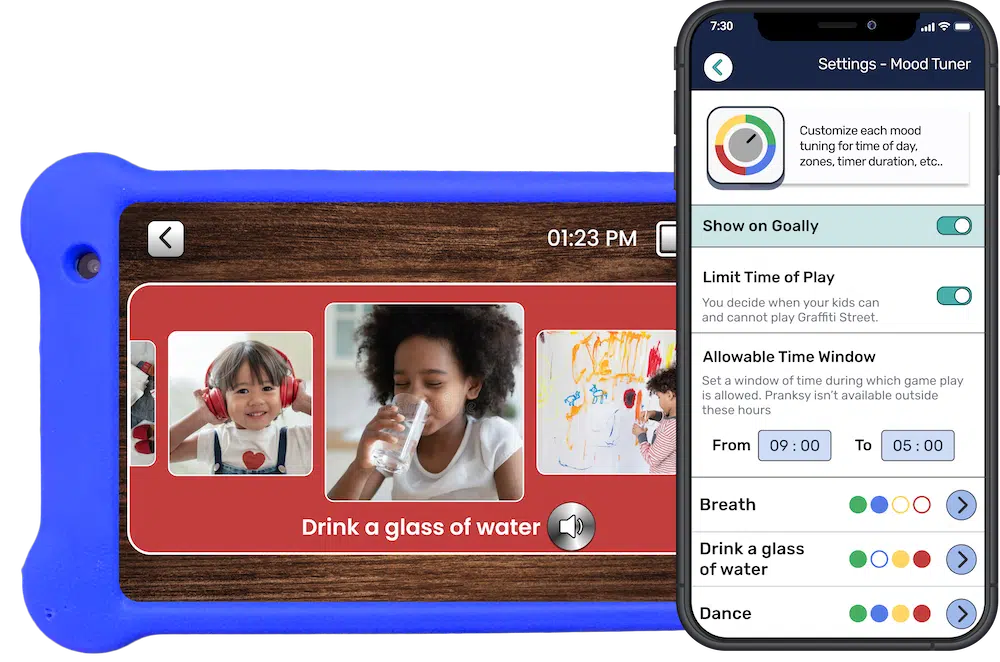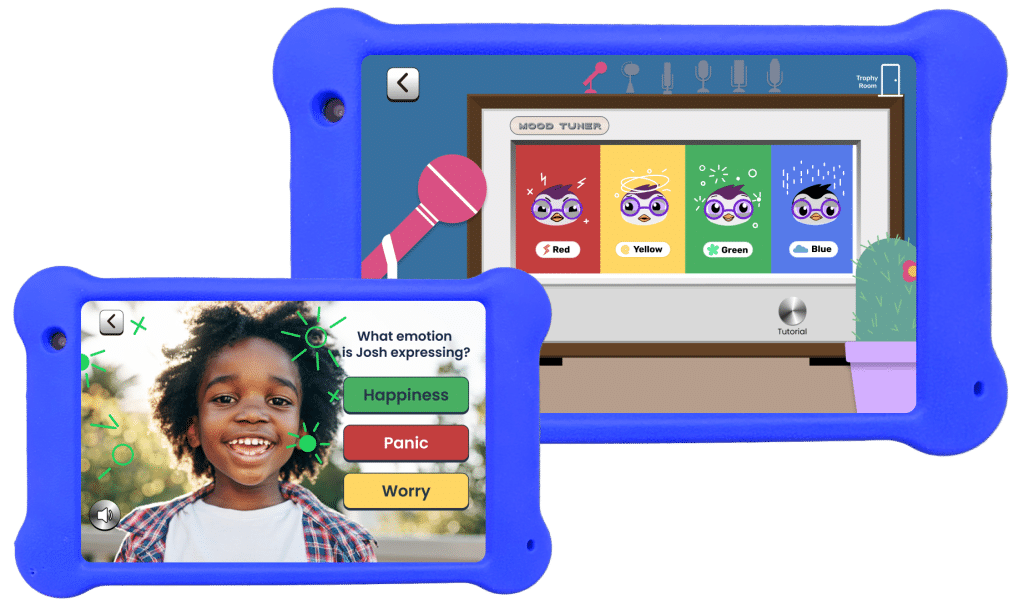Parenting an explosive child can be challenging, never knowing when the next outburst will occur. But fear not, with the right strategies and tools like Goally, you can help your child manage their emotions and foster a more harmonious home environment. In this blog post, we’ll look into the characteristics of an explosive child, discuss the limitations of traditional parenting methods, and provide actionable tips to support your neurodivergent child’s growth and development.
Table of Contents
Recommended Emotional Regulation Apps for an Explosive Child:

Goally’s Kid’s Tablet has an app called Mood Tuner to help kids identify & regulate their emotions in a fun way. Here’s a list of the 15 other top skill-building apps we recommend:
Understanding the Explosive Child
Defining the Explosive Child
First, let’s clarify what we mean by an “explosive child.” These kids may have difficulty regulating their emotions, leading to sudden outbursts of anger, frustration, or even aggression. This behavior can be due to various factors, including ADHD, autism, anxiety, or other thinking and learning differences.
It’s essential to recognize that explosive children aren’t “bad” or “misbehaving” on purpose. Their emotional reactions are often a result of feeling overwhelmed or misunderstood. To help them, we need to shift our perspective and approach.
Recognizing the Signs
Some common signs of an explosive child include:
- Intense emotional reactions
- Difficulty calming down after an outburst
- Frequent meltdowns or tantrums
- Aggressive behavior towards others or themselves
- Resistance to change or transitions
Why Traditional Parenting Methods Fall Short
The Limitations of Traditional Discipline
For many parents, traditional discipline methods like time-outs, rewards, and punishments might seem like the go-to solutions. However, these approaches often fail to address the root causes of an explosive child’s behavior. In fact, they can even exacerbate the situation.
Instead of focusing on punishment, parents should aim to understand the triggers behind their child’s outbursts and provide support to help them develop better-coping mechanisms.
Embracing a New Approach
By adopting a more empathetic and understanding approach, you can better support your explosive child. This involves:
- Listening to your child’s feelings and concerns
- Identifying the underlying causes of their behavior
- Providing guidance and tools to help them cope with their emotions

Read more: ADHD Emotional Outbursts
Strategies for Supporting Your Explosive Child
1. Identify Triggers
Observe your child and take note of the situations that lead to emotional outbursts. This information will help you anticipate and potentially avoid meltdowns.
Common triggers might include:
- Sensory overload
- Social situations
- Transitions or changes in routine
- Feeling misunderstood or unheard
2. Establish Routines
Neurodivergent kids often thrive on predictability. Creating a consistent daily routine can provide a sense of security and reduce anxiety. Goally can be a helpful tool in establishing and maintaining routines for your child.
3. Teach Emotional Regulation Skills
Help your child recognize and label their emotions. Encourage them to use calming techniques, such as deep breathing or counting, when they feel overwhelmed. Some strategies to teach emotional regulation include:
- Practicing mindfulness exercises
- Using visual aids, like emotion charts
- Role-playing different scenarios and discussing appropriate responses
4. Offer Choices
Giving your child options can help them feel more in control and less likely to react explosively. For example, you might offer:
- Choices in clothing or meals
- Options for activities or playtime
- Opportunities to make decisions about their daily routine

"Great tool for kids that is totally customizable for them. " — Bella Learn more →
5. Use Positive Reinforcement
Praise your child’s efforts and successes, no matter how small. This can boost their self-esteem and motivate them to continue making progress. Some ways to provide positive reinforcement include:
- Verbal praise for good behavior or effort
- Reward charts or sticker systems
- Celebrating achievements with small treats or special activities
6. Be Patient and Empathetic
Remember that your child is not intentionally trying to upset you. Show understanding and support as they navigate their emotions. This might involve:
- Offering a listening ear and validating their feelings
- Providing comfort and reassurance during difficult moments
- Remaining calm and composed during outbursts
Collaborative Problem Solving: A Powerful Tool for Parents
One approach that has proven effective for many parents of explosive children is Collaborative Problem Solving (CPS). This method, developed by Dr. Ross Greene, focuses on identifying and addressing the underlying issues that contribute to challenging behavior.
In short, CPS involves three steps:
- Empathy: Listen to your child’s concerns and validate their feelings.
- Define the problem: Clearly state the issue from both your perspective and your child’s perspective.
- Involve your child in finding a solution: Brainstorm ideas together and agree on a plan that meets both of your needs.
By involving your child in the problem-solving process, you can foster a sense of ownership and responsibility, ultimately leading to more lasting behavioral changes.
Goally | Kid’s Tablet for Helping Raise an Explosive Child
Is your child struggling with understanding and managing their emotions? Do they experience intense outbursts? Goally’s skill building kid’s tablet includes a Mood Tuner app that teaches emotional regulation skills in a fun and interactive way!

The Mood Tuner app encourages kids to look inwards and identify their feelings, helping them understand what’s going on inside. Once they’ve recognized their emotions, they can choose from a variety of exercises designed to help them self-regulate and find their balance.
Try Goally as an app for as low as $15. Or, opt for our dedicated skill-building tablet (which ONLY shows Goally apps) for $149, ensuring your child stays focused on their emotional growth journey.
Embrace the Journey: Supporting Your Explosive Child
Raising an explosive child can be challenging, but it’s also an opportunity for growth and learning. By understanding your child’s unique needs and employing strategies like CPS, you can create a more peaceful home environment and support your neurodivergent child’s development. Remember, there’s no one-size-fits-all solution. Be patient, stay open to new ideas, and celebrate your child’s progress along the way. Together, you can overcome the challenges and embrace the joys of parenting an explosive child. Goally can be a valuable resource in this journey, providing tools and support to help both you and your child navigate the ups and downs of daily life.
This post was originally published on 05/18/2023. It was updated on 07/12/2023.

Goally
We help parents teach their kids life skills, like doing bedtime and morning independently. Backed by science, we incorporate evidence-based practices and expert-informed designs in all of our apps and content.





